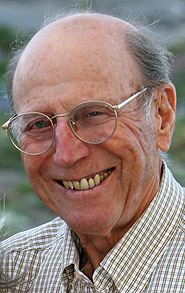Berkeleyan
Obituary
Virgil Schrock
![]()
24 October 2007
Virgil Schrock, professor emeritus of nuclear engineering and an internationally recognized expert in thermal hydraulics, died of cancer on Oct. 1 in Santa Rosa, at the age of 81.
 Virgil Schrock |
Much of Schrock's research and experimental work throughout his career focused on understanding boiling phenomena, but he also contributed to fundamental advances in areas related to heat transfer in porous media, shock- and pressure-wave propagation, fission-product-decay heat generation, two-phase flow reversal, pressurized thermal shock, and condensation.
Colleagues say Schrock's research in heat transfer and fluid mechanics helped move nuclear-power plants away from powered "active systems" of heat removal, reliant upon pumps and other equipment to operate, to gravity-driven "passive systems" for removing the nuclear reactor decay heat.
"One of the most important things for safety in a nuclear-power plant is the reliable removal of decay heat even after a plant shuts down," said professor Per Peterson, former chair of the Department of Nuclear Engineering. "Schrock's contributions helped in the development of a new generation of nuclear reactors that are considerably safer. His understanding and theories of heat transfer are now embodied in existing nuclear-power plants, as well as in the designs of the passive safety systems of new reactors now planned for construction in the United States."
Schrock was born on Jan. 22, 1926, in San Diego, where he grew up and attended high school. He earned his bachelor's and master's degrees in mechanical engineering at the University of Wisconsin, Madison, in 1946 and 1948, respectively.
He joined the faculty at Berkeley's Department of Mechanical Engineering as a lecturer in 1948, earning his second master's degree in mechanical engineering here in 1952. He then interrupted his career to serve as an engineering officer in the U.S. Navy in 1952. He returned to Berkeley in 1954 but continued his service in the Naval Reserve, rising to the rank of commander.
He became assistant professor in 1954, associate professor in 1960, and professor in 1968. In 1958 he began teaching in the newly formed Department of Nuclear Engineering and served as assistant dean in 1968. He retired from Berkeley in 1991 but remained active in his field, supervising graduate-student and postdoctoral researchers and serving on dissertation committees. In 1999 he was appointed a professor of the graduate school, a designation reserved for retired faculty who are fully engaged in research and who continue to contribute with distinction to the graduate program.
Schrock was elected as a fellow of both the American Society of Mechanical Engineers (ASME) and the American Nuclear Society, having chaired several national committees for these societies, and received numerous honors, including the ASME Heat Transfer Memorial Award, ASME Heat Transfer Division 50th Anniversary Award, and multiple best-paper awards.
Schrock and his family traveled widely because of his work, living in Italy, Japan, and China. In addition to being an avid hiker, gardener, carpenter, and tennis player, Schrock ran cross-country in college, participating in the San Francisco Bay to Breakers race into his 60s.
Schrock is survived by his wife of 61 years, Virginia, of Santa Rosa; his son, Douglas Schrock of Kenwood; his daughter, Nancy "Scout" Wilkins of Hamilton, Mont.; four grandsons; one great-granddaughter; and a brother, Don Schrock of Jefferson, Maine.
A celebration of Schrock's life is scheduled from noon to 3 p.m. on Saturday, Oct. 27, at the Oakmont East Recreation Center, 7902 Oakmont Dr., in Santa Rosa.
In lieu of flowers, donations in Schrock's memory may be made to an endowment fund being created in his name for graduate-student support in nuclear engineering. Checks may be made out to the Virgil E. Schrock Memorial Fund and sent to the College of Engineering, UC Berkeley, 208 McLaughlin Hall #1722, Berkeley, CA 94720-1722.
- Sarah Yang

